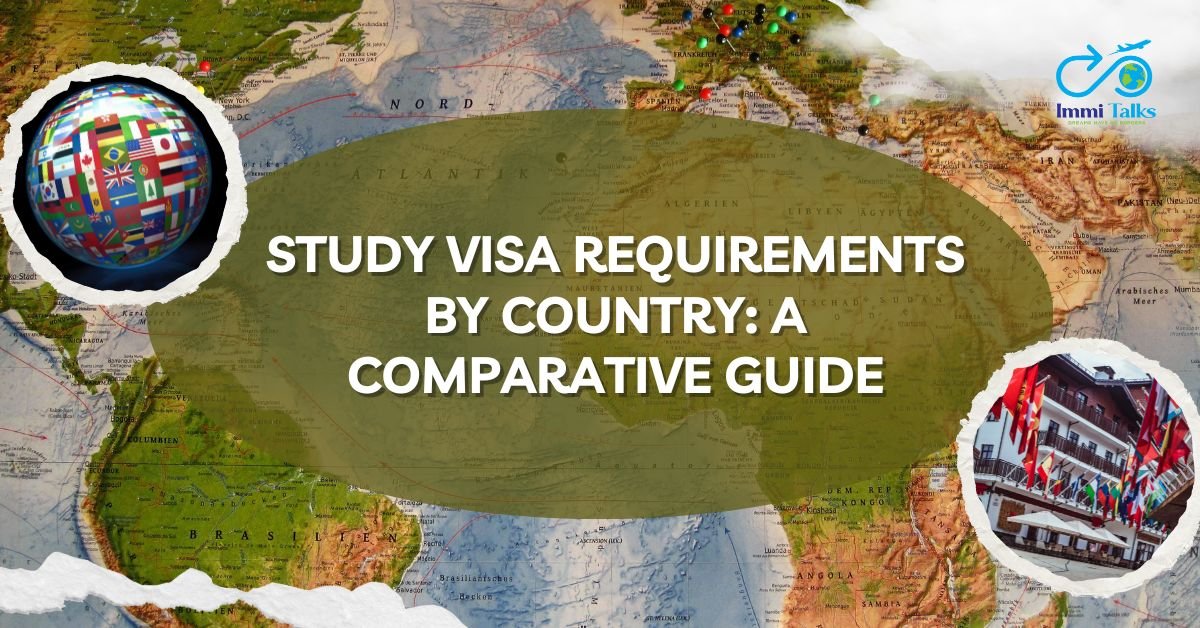Dreaming of studying abroad? You’re not alone. Every year, millions of students leap to pursue higher education in a new country, seeking global exposure and world-class learning opportunities. But before you can embark on this exciting journey, there’s an essential hurdle to cross—the study visa.
Navigating the study visa process can feel like a daunting task, especially with every country having its own set of rules and regulations. To simplify it for you, here’s a breakdown of the study visa requirements for some of the most popular destinations for international students.
Germany: Affordable Education and Global Recognition
Germany is a magnet for students, thanks to its free or low-cost education system and internationally recognized degrees. If you’re planning to study in this European hub, securing a student visa is essential.
Key Requirements:
- Admission Letter: You need confirmation of enrollment or conditional admission from a German university.
- Blocked Account: A deposit of approximately €11,208 in a blocked account to prove you can cover your living expenses during your stay.
- Health Insurance: Valid health insurance is mandatory for all international students.
- Language Proficiency: If your program is in German, you’ll need certificates like TestDaF or DSH. For English programs, IELTS or TOEFL scores are usually required.
Australia: Quality Education in a Sunny Setting
Australia’s high-ranking universities and vibrant lifestyle make it a dream destination for many students. To study here, you’ll need a Student Subclass 500 Visa.
Key Requirements:
- Confirmation of Enrollment (CoE): This official document from an Australian educational institution is your ticket to start the visa process.
- Genuine Temporary Entrant (GTE) Statement: A written statement explaining your intention to study in Australia temporarily.
- Proof of Funds: You’ll need to show financial capacity to cover tuition, living costs (around AUD 21,041 annually), and return airfare.
- Health Insurance: Enrollment in the Overseas Student Health Cover (OSHC) is mandatory.
- English Proficiency: Submit results from tests like IELTS, TOEFL, or PTE Academic, depending on your institution’s requirements.
United States: Land of Endless Opportunities
The United States remains one of the most popular study destinations, offering cutting-edge research facilities and prestigious institutions. Most students apply for an F-1 Visa to begin their academic journey.
Key Requirements:
- Acceptance Letter: You’ll need an official letter from a U.S. institution registered with SEVIS (Student and Exchange Visitor Information System).
- SEVIS Fee: Proof of payment for the SEVIS fee is mandatory.
- Financial Documentation: Provide bank statements or sponsorship letters to demonstrate you can afford tuition and living expenses.
- English Proficiency: Depending on your program, you may need TOEFL, IELTS, or equivalent scores.
- Visa Interview: You’ll need to attend an in-person interview at a U.S. embassy or consulate, so preparation is key.
Canada: Welcoming Policies and World-Class Education
Canada is known for its inclusiveness and high-quality education system, making it a top choice for students worldwide. You’ll need a Study Permit to begin your journey here.
Key Requirements:
- Letter of Acceptance: This document from a Designated Learning Institution (DLI) is essential.
- Proof of Funds: You must show you can cover tuition fees, living expenses (approximately CAD 10,000 annually), and return transportation.
- Immigration Medical Exam (IME): An IME is required for applicants from certain countries.
- Language Test Scores: IELTS or TOEFL results are often needed for non-native English speakers.
- Biometrics: You’ll also need to submit your fingerprints and photograph as part of the process.
United Kingdom: Tradition Meets Excellence
With its rich history and world-renowned universities, the UK is a prime destination for students. To study here, you’ll need a Student Visa (formerly Tier 4).
Key Requirements:
- Confirmation of Acceptance for Studies (CAS): Provided by your university, this document is vital for your application.
- Financial Proof: You’ll need to show funds to cover tuition fees and living expenses (approximately £1,334 per month in London or £1,023 outside London).
- English Proficiency: Most universities require IELTS or similar English language test scores.
- Health Surcharge: Pay the Immigration Health Surcharge (IHS) to access the UK’s healthcare services during your stay.
Tips for Navigating Study Visa Applications
- Start Early: Don’t wait until the last minute. Begin your application process well in advance to avoid delays.
- Organize Your Documents: Gather all necessary paperwork, including financial proofs, language test results, and admission letters, and ensure they are up to date.
- Read the Guidelines: Follow the instructions specific to your destination country carefully.
- Prepare for Interviews: If required, practice answering questions confidently to make a strong impression.
Why Professional Guidance Matters
If you’re feeling lost in the maze of study visa requirements, don’t worry—you’re not alone. Services like ImmiTalks specialize in simplifying the visa process. Their expert consultants provide personalized advice, keep you updated on changing regulations, and ensure your application is error-free. With ImmiTalks, you can focus on preparing for your academic journey while they handle the paperwork.
Final Thoughts
Securing a study visa is an essential milestone in your journey to studying abroad. While each country has its own rules and procedures, thorough preparation and understanding of the requirements can make the process smoother.
By staying organized, starting early, and seeking help when needed, you can turn your dream of studying abroad into a reality. The world is waiting—are you ready to take the first step?






Clarte Nexive Avis
Clarte Nexive se differencie comme une plateforme de placement crypto innovante, qui met a profit la puissance de l’intelligence artificielle pour proposer a ses membres des atouts competitifs majeurs.
Son IA etudie les marches financiers en temps reel, detecte les occasions interessantes et met en ?uvre des strategies complexes avec une exactitude et une rapidite hors de portee des traders humains, maximisant ainsi les potentiels de profit.
TurkPaydexHub
TurkPaydexHub se distingue comme une plateforme d’investissement crypto revolutionnaire, qui utilise la puissance de l’intelligence artificielle pour offrir a ses utilisateurs des atouts competitifs majeurs.
Son IA analyse les marches en temps reel, detecte les occasions interessantes et met en ?uvre des strategies complexes avec une exactitude et une rapidite inaccessibles aux traders humains, augmentant de ce fait les potentiels de rendement.
TurkPaydexHub Official Page
TurkPaydexHub se demarque comme une plateforme de placement crypto revolutionnaire, qui met a profit la puissance de l’intelligence artificielle pour proposer a ses membres des atouts competitifs majeurs.
Son IA scrute les marches en temps reel, identifie les opportunites et execute des strategies complexes avec une precision et une vitesse inaccessibles aux traders humains, augmentant de ce fait les perspectives de gain.